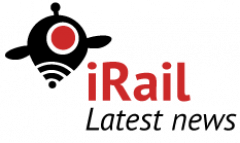Open information
Although «open data» and iRail are often mentioned in the same sentence, they are no synonyms. In fact, we don’t even want to provide open data! It’s not a goal of the non profit Jumping Castle organisation (NPO) to provide datadumps or sublicense data that might be copyrighted. We are also not going to redistribute already available datasets. Let’s get this misconception out of the way…
Data and information
There is a huge difference between data and information: datasets are huge collections on which you perform queries. Information is the answer to such a query. For instance, if I ask iRail on what platform the train to Antwerp leaves, that’s information. It’s not our purpose to provide users with copious amounts of data concerning all trains on a given day.
To us, the software developers in the NPO, accessibility of information is the most important aspect of our application. If we provide our users with a wrong or incomplete response to their query, nobody will use the application, how nicely engineered it may be. The actual visualisation of that information is realised by a third party, contacting our servers through a well-documented application programming interface (API).
To be able to provide this service the iRail servers need to have access to the relevant data. Since we (plan to) use a lot of datasets – trains, buses, underground, tube, weather reports, street names, point-of-interests… -, it is impractical to require all of our developers to get proper permissions. Therefore the NPO is a huge supporter of open data, which allows everybody to access data without explicit approval. However, having such access to data isn’t only beneficial to us, it is also a key to innovation.
Open information
Recently, we sent a letter to the MIVB/STIB asking to access their data. This would allow our API to provide bus information for the Brussels region as well. Their response was one of plain refusal, since they though we would sublicense their data, something against the company’s terms of data sharing. I hope my reply, similar to this blogpost, brought clarity.
Needless to say, we don’t agree with their point of view:
- We don’t provide data, we provide information. Developers create «browsers» to this information, using our API.
- We don’t sublicense data, as we don’t allow someone else to download datadumps. This is not our responsibility, the data should already be available for download on the company’s site.
- We cannot sublicense something that’s not copyrighted. According to the second European database law, public transport information cannot be copyrighted.
But there is some good news! De Lijn will soon provide us with bus-data for Flanders on these very terms. We cannot call it open data though, as only the iRail servers Bouncy Castle For Sale will have access to the raw data. We will however provide open information: everyone can create applications to fetch information from our API, and the NPO will support those people.
A long way
It’s a long way to get the word out. People pulling the strings usually don’t realise how opening data might even be profitable. But there is also a fear of quality loss when people are allowed to distribute the data over and over again. To that end, open information is the perfect balance between open data and closed data, with the quality being assured by the open API. Creation of such an API can always be out-sourced to NPO’s such as the iRail vzw/asbl. Do not hesitate to contact us!
Pieter and Tim (@pietercolpaert, @maleadt)

